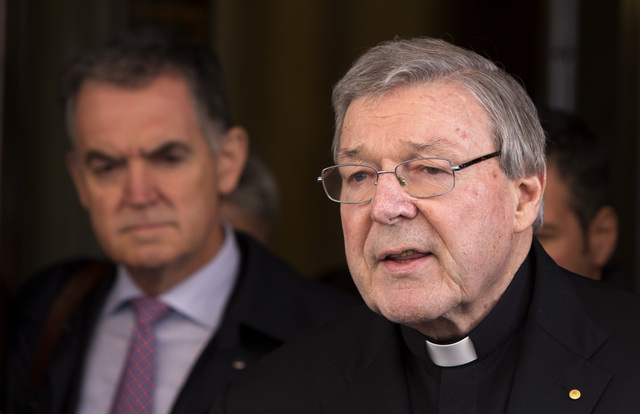ROME (AP) — A top Vatican official vowed Thursday to work to put an end to the rash of suicides in his Australian hometown over the church sex abuse scandal after meeting with victims and acknowledging that he failed to
ROME (AP) — A top Vatican official vowed Thursday to work to put an end to the rash of suicides in his Australian hometown over the church sex abuse scandal after meeting with victims and acknowledging that he failed to act on an abuse allegation decades ago.
Cardinal George Pell, Pope Francis’ top financial adviser, met Thursday with some of the Australian abuse victims who travelled to Rome to witness his four days of remote, video-link testimony to Australia’s Royal Commission. The commission is investigating how the Catholic Church and other institutions responded to the sexual abuse of children over decades.
Emerging from the meeting with survivors at a Rome hotel, Pell read a statement pledging to help his hometown of Ballarat recover from scores of suicides of abuse victims. He said he hoped the city of 100,000 might one day become “an example for practical help for all those wounded by the scourge of sexual abuse.”
“One suicide is too many. And there have been many such tragic suicides,” Pell told reporters. “I commit myself to work with the group to try to stop this so that suicide is not seen as an option for those who are suffering.”
Ballarat, a heavily Catholic city in Australia’s Victoria state, has had a devastating experience with the abuse scandal. Testimony to the Royal Commission revealed how the Christian Brothers religious order, in particular, preyed on dozens of children in the schools it ran from the 1960s to 1980s.
Pell was called to answer questions about his time as a priest in Ballarat, and as an auxiliary bishop in Melbourne. The four days of testimony saw the 74-year-old cardinal answer questions from the commission and a succession of lawyers for victims from around 10 p.m.-2 a.m. each night.
Pell said he was also providing a daily summary of his testimony to Francis.
During the final round, Pell acknowledged that he didn’t immediately act when a schoolboy brought an abuse allegation to him in 1974 against a cleric and said he should have done more. Pell told the inquiry he was a junior priest when the unnamed student at St. Patrick’s College in Ballarat told him that Christian Brothers teacher Edward Dowlan “is misbehaving with boys.”
Pell said he eventually raised concerns about Dowlan with the school chaplain. The chaplain replied that the Christian Brothers order was “dealing with” the allegations.
Dowlan was later removed from the school but he continued to abuse children as a teacher at other schools until 1985.
“With the experience of 40 years later, certainly I would agree that I should have done more,” Pell said.
At the same time, Pell denied allegations that he angrily dismissed an allegation against the same cleric made by another schoolboy, or attempted to bribe an abuse victim to stay quiet.
Pell said it was a “disastrous coincidence” that five known pedophile Catholic clerics had been operating in Ballarat while he served there as a priest.
“We now know it was one of the very worst places in Australia” for child sex crime, Pell said.
The victims who travelled to Rome had hoped for a meeting with the pope before they return home on Friday, but the Vatican spokesman, the Rev. Federico Lombardi, said no papal audience was planned.
Anthony Foster, whose two daughters were abused by a priest near Melbourne, said he wanted more from the church than mere words.
“We need the whole weight of the church put behind helping these victims and ensuring this doesn’t happen again,” he said after Pell’s statement, holding up a photo of his two girls, one of whom later committed suicide.
He expressed satisfaction with the hearing and predicted there would be “some pretty damning findings” against Pell when the commission produces its final report.
“George Pell was the auxiliary bishop in our area, looking after the priest who did that to my girls,” Foster said, thrusting the photo high. “Here they are. Can you not see?”



